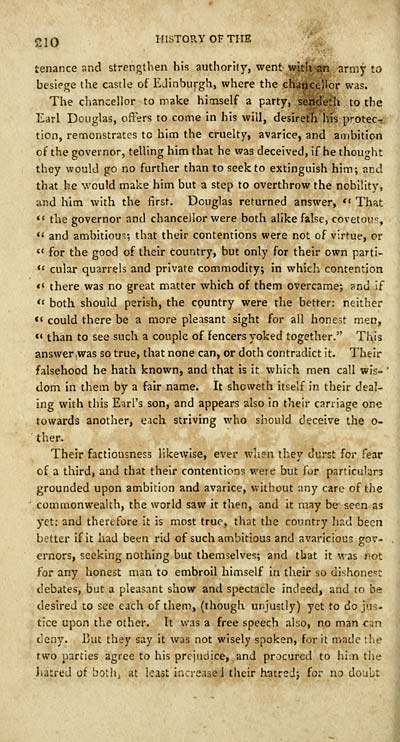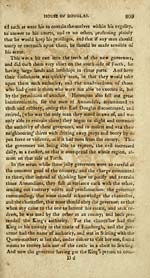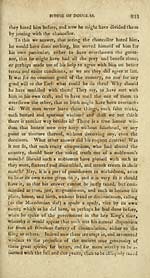History of the house and race of Douglas and Angus
(238) Page 210
Download files
Complete book:
Individual page:
Thumbnail gallery: Grid view | List view

:io
HISTORY OF THE
tenance and strengthen his authority, went with an army to
besiege the castle of Edinburgh, where the chancellor was.
The chancellor to make himself a party, sendeth to the
Earl Douglas, offers to come in his will, desireth his protec-
tion, remonstrates to him the cruelty, avarice, and ambition
of the governor, telling him that he was deceived, if he thought
they would go no further than to seek to extinguish him; and
that he would make him but a step to overthrow the nobility,
and him with the first. Douglas returned answer, «« That
" the governor and chancellor were both alike false, covetous,
i* and ambitious; that their contentions were not of virtue, or
" for the good of their country, but only for their own parti-
** cular quarrels and private commodity; in which contention
«< there was no great matter which of them overcame; ?nd if
« both should perish, the country were the better: neither
'« could there be a more pleasant sight for all honest men,
« than to see such a couple of fencers yoked together." This
answer was so true, that none can, or doth contradict it. Their
falsehood he hath known, and that is it which men call wis- '
dom in them by a fair name. It showeth itself in their deal-
ing with this Earl's son, and appears also in their carriage one
towards another, each striving who should deceive the o-
ther.
Their factiousness likewise, ever when they durst for fear
of a third, and that their contentions were but for particulars
grounded upon ambition and avarice, without any care of the
commonwealth, the world saw it then, and it may be~ seen as
yet: and therefore it is most true, that the country had been
better if it had been rid of such ambitious and avaricious gov-
ernors, seeking nothing but themselves; and that it was not
for any honest man to embroil himself in their so dishonest
debates, but a pleasant show and spectacle indeed, and to be
desired to see each of them, (though unjustly) yet to do jus-
tice upon the other. It was a free speech also, no man can
deny. But they say it was not wisely spoken, for it made the
two parties agree to his prejudice, and procured to him the
hatred of both, at least increased their hatred; for no doubt
HISTORY OF THE
tenance and strengthen his authority, went with an army to
besiege the castle of Edinburgh, where the chancellor was.
The chancellor to make himself a party, sendeth to the
Earl Douglas, offers to come in his will, desireth his protec-
tion, remonstrates to him the cruelty, avarice, and ambition
of the governor, telling him that he was deceived, if he thought
they would go no further than to seek to extinguish him; and
that he would make him but a step to overthrow the nobility,
and him with the first. Douglas returned answer, «« That
" the governor and chancellor were both alike false, covetous,
i* and ambitious; that their contentions were not of virtue, or
" for the good of their country, but only for their own parti-
** cular quarrels and private commodity; in which contention
«< there was no great matter which of them overcame; ?nd if
« both should perish, the country were the better: neither
'« could there be a more pleasant sight for all honest men,
« than to see such a couple of fencers yoked together." This
answer was so true, that none can, or doth contradict it. Their
falsehood he hath known, and that is it which men call wis- '
dom in them by a fair name. It showeth itself in their deal-
ing with this Earl's son, and appears also in their carriage one
towards another, each striving who should deceive the o-
ther.
Their factiousness likewise, ever when they durst for fear
of a third, and that their contentions were but for particulars
grounded upon ambition and avarice, without any care of the
commonwealth, the world saw it then, and it may be~ seen as
yet: and therefore it is most true, that the country had been
better if it had been rid of such ambitious and avaricious gov-
ernors, seeking nothing but themselves; and that it was not
for any honest man to embroil himself in their so dishonest
debates, but a pleasant show and spectacle indeed, and to be
desired to see each of them, (though unjustly) yet to do jus-
tice upon the other. It was a free speech also, no man can
deny. But they say it was not wisely spoken, for it made the
two parties agree to his prejudice, and procured to him the
hatred of both, at least increased their hatred; for no doubt
Set display mode to:
![]() Universal Viewer |
Universal Viewer | ![]() Mirador |
Large image | Transcription
Mirador |
Large image | Transcription
Images and transcriptions on this page, including medium image downloads, may be used under the Creative Commons Attribution 4.0 International Licence unless otherwise stated. ![]()
| Histories of Scottish families > History of the house and race of Douglas and Angus > (238) Page 210 |
|---|
| Permanent URL | https://digital.nls.uk/94876470 |
|---|
| Description | A selection of almost 400 printed items relating to the history of Scottish families, mostly dating from the 19th and early 20th centuries. Includes memoirs, genealogies and clan histories, with a few produced by emigrant families. The earliest family history goes back to AD 916. |
|---|

